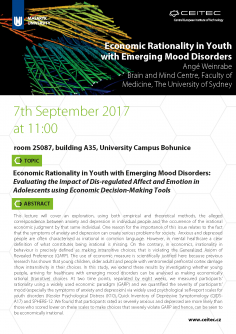Abstract
This lecture will cover an exploration, using both empirical and theoretical methods, the alleged correspondence between anxiety and depression in individual people and the occurrence of the irrational economic judgment by that same individual. One reason for the importance of this issue relates to the fact that the symptoms of anxiety and depression can create serious problems for society. Anxious and depressed people are often characterised as irrational in common language. However, in mental healthcare a clear definition of what constitutes being irrational is missing. On the contrary, in economics, irrationality in behaviour is precisely defined as making intransitive choices; that is violating the Generalized Axiom of Revealed Preference (GARP). The use of economic measure is scientifically justified here because previous research has shown that young children, older adults and people with ventromedial prefrontal cortex damage show intransitivity in their choices. In this study, we extend these results by investigating whether young people, arriving for healthcare with emerging mood disorders can be analysed as making economically rational (transitive) choices. At two time points, separated by eight weeks, we measured participants’ rationality using a widely used economic paradigm (GARP) and we quantified the severity of participants' mood (especially the symptoms of anxiety and depression) via widely used psychological self-report scales for youth disorders (Kessler Psychological Distress (K10), Quick Inventory of Depressive Symptomology (QIDS-A17) and SPHERE-12. We found that participants rated as severely anxious and depressed are more likely than those who scored lower on these scales to make choices that severely violate GARP and hence, can be seen to be economically irrational.








